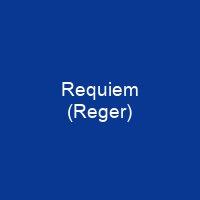Max Reger’s 1915 Requiem is a late Romantic setting of Friedrich Hebbel’s poem “Requiem” for alto or baritone solo, chorus and orchestra. Reger had composed Requiem settings before: his 1912 motet for male chorus, published as the final part of his Op. 83, uses the same poem. In 1914 he set out to compose a choral work in memory of the victims of the Great War.
About Requiem (Reger) in brief

In 1915 he had composed the Requiem for soloist, choir and orchestra, again on men’s poem, again in the setting for men’s chorus. He thought the Hebbelrequiem was among the most beautiful things he ever wrote. It has been described as of “lyrical beauty, a dramatic compactness, and economy of musical means” in which the composer’s “mastery of impulse, technique, and material is apparent’”. Reger was a German composer, born in Brand in 1873 and raised in Weiden in der Oberpfalz. He studied music theory from April to July 1890 with Hugo Riemann at the royal conservatory in Sondershausen and continued his studies, in piano and theory, at the Wiesbaden Conservatory beginning in September of that year. He established himself as a keyboard composer, performer, and teacher of piano and organ. The first compositions to which he assigned opus numbers were chamber music. In 1891 he composed his Sechs Lieder, Op. 4, a collection of six songs. In 1913 he composed four tone poems on paintings by Arnold Böcklin, including the painting Die Toteninsel, as his Op 128.
You want to know more about Requiem (Reger)?
This page is based on the article Requiem (Reger) published in Wikipedia (as of Nov. 05, 2020) and was automatically summarized using artificial intelligence.







